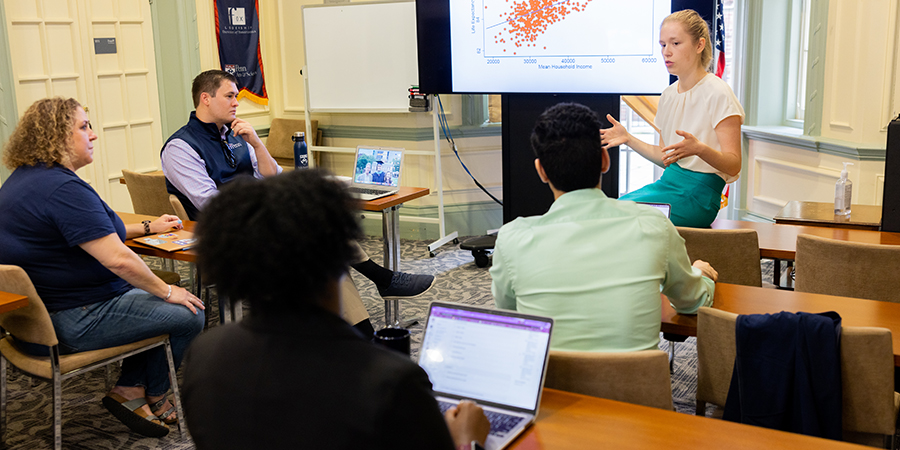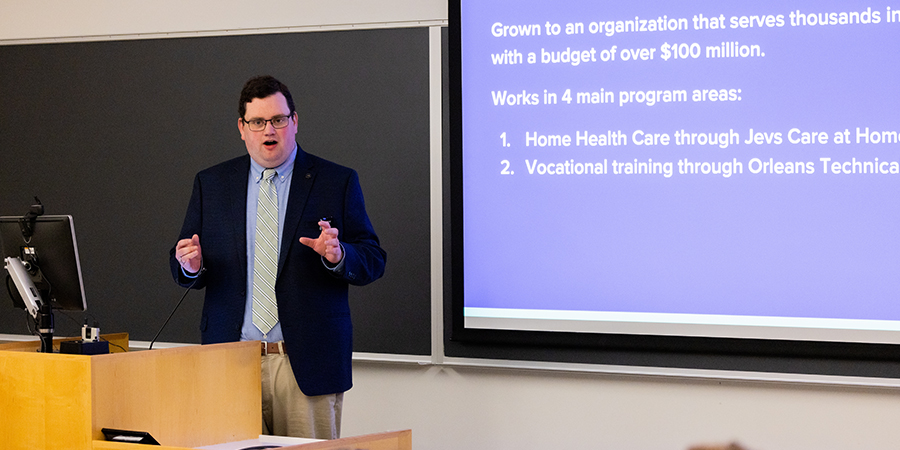Increase your public impact with an Ivy League degree
The Fels Executive Master of Public Administration (Executive MPA) program is an innovative, practitioner-focused degree designed to meet the needs of professionals with at least five years of experience seeking to advance in—or pivot into—the public and nonprofit sectors without interrupting your career. In addition to weekly synchronous, online class meetings, students come to campus monthly for required day-long courses during Friday-Saturday Executive Weekends throughout the program. This low-residency format offers Executive MPA students the opportunity to complete an Ivy League degree in less than two years while continuing to work full time—regardless of where you live and work. Our curriculum takes the theory beyond the classroom and prepares you to take the lead in the public sphere: This 10-course, 10 c.u.* program includes a capstone project designed to build the knowledge, skills, and practical experience needed to translate ideas into real-world results.
Executive MPA curriculum and courses
As an Executive MPA student, you complete a 10 course, 10 c.u. program to earn the degree. Executive MPA courses are a hybrid format, with weekly synchronous, online meetings on Monday nights and once-monthly Friday through Saturday on-campus meetings (9:30 a.m. – 5:30 p.m. each day) in Philadelphia. In consultation with an advisor, you also chose three electives to branch out or specialize in particular areas of interest; elective courses may be selected from schools across Penn, including the Carey Law School, the Wharton School, and the School of Social Policy and Practice.
Executive MPA course schedule
These are the courses that all Executive MPA students take and are required for completion of the program.
- GAFL 6120 Quantitative Methods for Policy Analysis: This course helps students learn how to make evidence-based decisions in a public sector context. The course introduces important data analysis skills and helps students evaluate the quality of studies undertaken to measure the impact of public policies and programs.
- GAFL 7330 Public Management: How can you become an effective public manager? Technical skills in budgeting, organization, and management are not enough; you need to understand the social and political context of the organization and be able to effectively coordinate with relevant stakeholders to produce change. Working with real-world examples, this class helps students develop this competency.
- GAFL 6222 Economic Principles of Public Policy: This course introduces students to key economic concepts such as scarcity, efficiency, monopolies, and cost-benefit. Students practice applying these principles to the range of decisions that public sector executives have to make in order to understand the trade-offs inherent in any public policy or program.
- GAFL 6410 Program Evaluation and Data Analysis: This course introduces program evaluation in the context of research methods. Students learn about design and the application of data collection skills to all phases of program/service delivery from needs assessment to analysis of findings to implementation of changes based on results. Students learn to appreciate how these skills can be used as practical tools for identifying problems to developing and implementing programs. This applied course provides students with practical experiences to apply guidelines of evaluation and research methods in actual program evaluation projects in Philadelphia.
- GAFL 6520 Financial Management of Public and Nonprofit Institutions: This course provides an introduction to financial management principles for public and nonprofit organizations. The primary objective of this course is to demystify financial information and improve students’ ability to effectively engage in financial discussions, regardless of their role in the organization. This course focuses on the vocabulary and tools necessary to interpret, analyze, and properly communicate financial information in order to develop and execute an appropriate financial strategy.
- GAFL 6330 Executive Leadership: This dynamic and interactive course, exclusive to the EMPA program, will cover crisis management, messaging, dialoguing across difference, hiring and human resources, intercultural communication, building productive working relationships, and inclusive leadership techniques.
- Elective #1: Chosen in consultation with the student’s advisor. Review the full graduate course catalog.
- Elective #2: Chosen in consultation with the student’s advisor. Review the full graduate course catalog.
- GAFL 7980 MPA Capstone I (executive format): This required non-credit class is the first part of the MPA Capstone, which is a requirement for the Executive Master of Public Administration program. During MPA Capstone I, students work through the early stages of their capstone projects, including project planning and project research and design. Examples of early-stage work include conducting background research, creating a working bibliography, designing the project, and planning and executing data collection. Students work with their capstone instructor, advisor, and community partner organization. Executive MPA students take MPA Capstone I during their second fall semester.
- Elective #3: Chosen in consultation with the student’s advisor. Review the full graduate course catalog.
- GAFL 7990 MPA Capstone II: Successful completion of a capstone project is one of the academic requirements for the Executive Master of Public Administration program. During MPA Capstone II, students work through the middle and final stages of their capstone projects, including conducting analysis, writing, and creating and presenting deliverables. Students work with their capstone instructor, advisor, and community partner organization. This core course is designed to give students direct guidance as they apply and consolidate knowledge and skills gained across the curriculum through the completion of a rigorous capstone project. Capstone students are responsible for designing and completing a public policy or public administration-related project and presenting to the Fels community and other stakeholders. Executive MPA students complete MPA Capstone II during their second spring semester.
- GAFL 5020 Public Communications: Successful leaders must be able to convey their integrity and their ideas, their vision, and their values clearly and convincingly in public settings. By analyzing great political speeches and affording students the opportunity to prepare and deliver different types of speeches, this course teaches the fundamentals of persuasive public speaking while encouraging students to develop their own voices. This is a performance course. Students will gain skill and confidence in their speech writing and public speaking skills through practice, peer feedback, and extensive professional coaching. Class lectures and discussions will focus on persuasive strategies and techniques for handling community meetings, Q & A sessions, and interactions with the media.
- GAFL 5280 Critical Issues in Public Finance: Critical Issues in Public Finance will consider contemporary issues affecting the fiscal state of local governments. Covered will be issues that have distressed municipalities; the policies/initiatives that seek to rectify such, including privatization/public-private partnerships; reformation of municipal pensions; sustainable education funding alternatives; and tax policies aimed at promoting economic growth. Students will be assigned to a team, which will identify and provide a solution for an issue or issues plaguing a fictional government. Each team will prepare a written report and make a presentation, all of which will constitute the final project. Assignments will serve as the building blocks for the final written work product and presentation developed by each team. The class is divided into four modules. The first module will take a historical look at events behind fiscal distress in municipalities and then explore current-day drivers that are causing the same today. Modules two, three, and four will examine some of the tools that have been used successfully or otherwise to remediate the drivers of fiscal distress. In each module, case studies will be used to further analyze the particular fiscal challenge of a municipality. Written assignments will be based on case studies.
- GAFL 5420 AI for Public Sector Leadership: This course prepares future public sector leaders to effectively leverage artificial intelligence (AI) in government and nonprofit organizations. While technical knowledge is valuable, this course focuses on developing the strategic and practical skills needed to identify, evaluate, and implement AI solutions to public sector challenges. Through a combination of case studies, hands-on projects, and expert guest speakers, students will learn how to be intelligent consumers and managers of AI technologies in public service contexts.
- GAFL 5490 Leading Nonprofits: Leading Nonprofits is designed for those interested in leading and managing a nonprofit organization. It takes a practitioner’s perspective on strategic realities of modern practice. Each section will seek to rapidly orient a new manager to the complexities, strategic issues, and politics. The course is taught through a combination of theory and practice using selected readings, lectures, guest presentations, group activities (mock senior staff discussions), and field assignments (pairing with an area nonprofit leader and attendance at one of the organizations' board meetings.)
- GAFL 7100 Negotiations: To influence public policy, you need analytical skills to discover optimal solutions to problems, and good negotiation skills to tailor implementable solutions that address the needs and priorities of multiple stakeholders. What resources you want to invest, whom you engage in discussions, and what you expect to receive in return are open to explicit and implicit negotiations. This course will provide a working understanding of key negotiations concepts, including: Strategic elements of negotiations—interests, goals, positions, rights, power, value creation, high stakes, disputes; preparation for and the details of negotiation processes; ethical encounters and conundrums; and leveraging your strengths/understanding your negotiating personality. You will learn cooperative and competitive strategies, have a solid grasp of the decision-making science of negotiation, and better understand cognitive processes and emotional dynamics that affect the ways people negotiate.
Students in the Executive MPA program may pursue an optional concentration in one of five areas. Each concentration requires the completion of two elective courses and a capstone project related to the concentration area. Note that some required concentration courses may be offered only on campus.
- Political Advocacy Concentration: The political advocacy concentration allows EMPA students to deepen their understanding of government relations and the policy process, develop their communication skills, and learn how to engage diverse stakeholders to achieve change. This concentration is ideal for students seeking a role as a lobbyist, elected official, community organizer, legislative staffer, communications specialist, and other public sector and advocacy-related roles.
- International Affairs Concentration: The international affairs concentration equips EMPA students with the skills they need to engage in international relations work and public sector administration in a global context. Students develop an understanding of the “international order” and how it affects trade, politics, and security, the ability to synthesize primary source texts, data, and other research to inform policy recommendations on contemporary international policy issues, and strong written and oral communication skills.
- Nonprofit Management Concentration: The nonprofit management concentration equips EMPA students with the skills they need to lead and manage a nonprofit organization. Students completing this concentration will be well-prepared for a career as an Executive Director or other senior leadership roles in a non-profit organization.
- Domestic Policy Concentration: The domestic policy concentration equips EMPA students with the skills they need to analyze and assess policy in the US context. Students completing this concentration will be able to analyze and evaluate policies with economic, social, and political lenses, synthesize complex information for public decision-makers, and make evidence-based policy recommendations.
- Data Analytics Concentration: The data analytics Concentration equips EMPA students with the skills they need to collect and analyze data to make evidence-based decisions in the public sector.
- Individualized Concentration: Students who do not select one of the five individualized concentrations will be automatically defaulted into an individualized concentration. An individualized concentration allows students to take any combination of graduate-level elective courses and complete any capstone project tailored to the student’s interests.
Through the capstone project, you synthesize what you’ve learned across your coursework to develop real-world solutions that can be applied immediately to the workplace. With guidance from Fels advisors, you evaluate and analyze a challenge in your chosen career and apply your classroom knowledge to propose practical solutions.
*Academic credit is defined by the University of Pennsylvania as a course unit (c.u.). A course unit (c.u.) is a general measure of academic work over a period of time, typically a term (semester or summer). A c.u. (or a fraction of a c.u.) represents different types of academic work across different types of academic programs and is the basic unit of progress toward a degree. One c.u. is usually converted to a four-semester-hour course.
Executive Weekend schedules
Executive Weekends (monthly Friday-Saturday meetings, held on campus in Philadelphia) allow you to learn from, be inspired by, and build enduring professional relationships with members of your cohort as well as Fels’ world-class faculty, professors of practice, and guests.
Executive Weekends are required for all Executive MPA students and take place on selected consecutive Fridays and Saturdays one weekend a month. These intensive weekends may include class discussions, group activities, and Fels events, including Friday night networking events on-site from 5:30 – 7 p.m.
Spring 2025, on-site classes, Fridays and Saturdays, 9:30 a.m. – 5:30 p.m.
- January 24-25
- February 21-22
- March 28-29
- April 25-26
Summer 2025, on-site classes, Fridays and Saturdays, 9:30 a.m. – 5:30 p.m.
- May 30-31
- June 27-28
- July 25-26
- August 15-16
Fall 2025, on-site classes, Fridays and Saturdays, 9:30 a.m. – 5:30 p.m.
- September 5-6
- October 3-4
- November 7-8
- December 5-6
Spring 2026, on-site classes, Fridays and Saturdays, 9:30 a.m. – 5:30 p.m.
- January 23-24
- February 20-21
- March 27-28
- April 24-25











